Willi Forst est un Acteur, Réalisateur, Scénariste et Producteur Autrichien né le 7 avril 1903 à Vienne (Autriche)

Willi Forst, born Wilhelm Anton Frohs (7 April 1903 – 11 August 1980) was an Austrian actor, screenwriter, film director, film producer and singer. As a debonair actor he was a darling of the German-speaking film audiences, as a director, one of the most significant makers of the Viennese period musical melodramas and comedies of the 1930s known as Wiener Filme. From the mid-1930s he also recorded many records, largely of sentimental Viennese songs, for the Odeon Records label owned by Carl Lindström AG.
Following the annexation of Austria in 1938, he was much courted by the National Socialists but succeeded in avoiding overt political statement, concentrating entirely on the opulent period musical entertainment for which he was famous and which was much in demand during World War II. During the seven-year period of National Socialist rule in Austria, he only made four films, none of them political (although his ardent Vienna-Austrian topos is considered subversive of pan-German Nazism by many film historians), and which are considered among his finest and classics of the Viennese Film genre.
He had comparatively little success after the war with the exception of the film Die Sünderin ("The Sinner") (1950) starring Hildegard Knef, which became a scandal because of the protests of the Roman Catholic church against its nudity, the first in German-speaking cinema, but which subsequently attracted an audience of seven million people. He gave international actress Senta Berger her first role in 1957 and that same year directed his last film (Wien, du Stadt meiner Träume), after which he retired from the industry, suggesting that his style was no longer in demand.
After the death of his wife in 1973 he lived a reclusive life in the Swiss canton of Tessin. He died of cancer in Vienna in 1980 and is buried in Neustift am Walde. Forst is today considered one of Europe's important early sound directors.
Source : Wikidata
Willi Forst

- Infos
- Photos
- Meilleurs films
- Famille
- Personnages
- Récompenses
Nom de naissance Wilhelm Anton Frohs
Nationalité Autriche
Naissance 7 avril 1903 à Vienne (Autriche)
Mort 11 aout 1980 (à 77 ans) à Vienne (Autriche)
Nationalité Autriche
Naissance 7 avril 1903 à Vienne (Autriche)
Mort 11 aout 1980 (à 77 ans) à Vienne (Autriche)
Willi Forst, born Wilhelm Anton Frohs (7 April 1903 – 11 August 1980) was an Austrian actor, screenwriter, film director, film producer and singer. As a debonair actor he was a darling of the German-speaking film audiences, as a director, one of the most significant makers of the Viennese period musical melodramas and comedies of the 1930s known as Wiener Filme. From the mid-1930s he also recorded many records, largely of sentimental Viennese songs, for the Odeon Records label owned by Carl Lindström AG.
Biographie
His first major role was opposite Marlene Dietrich in the silent film Café Elektric in 1927. He was best known, however, for his characters in light musicals, which rapidly made him a star. He developed the genre of the Viennese Film with writer Walter Reisch in the 1930s, beginning with the Franz Schubert melodrama Leise flehen meine Lieder (1934) which became an iconic role for actor Hans Jaray and Maskerade (1934), which launched his fame as a significant director and brought Paula Wessely to international fame. He founded his own film company, Willi Forst-Film, in 1937 and considered a move to Hollywood the same year.Following the annexation of Austria in 1938, he was much courted by the National Socialists but succeeded in avoiding overt political statement, concentrating entirely on the opulent period musical entertainment for which he was famous and which was much in demand during World War II. During the seven-year period of National Socialist rule in Austria, he only made four films, none of them political (although his ardent Vienna-Austrian topos is considered subversive of pan-German Nazism by many film historians), and which are considered among his finest and classics of the Viennese Film genre.
He had comparatively little success after the war with the exception of the film Die Sünderin ("The Sinner") (1950) starring Hildegard Knef, which became a scandal because of the protests of the Roman Catholic church against its nudity, the first in German-speaking cinema, but which subsequently attracted an audience of seven million people. He gave international actress Senta Berger her first role in 1957 and that same year directed his last film (Wien, du Stadt meiner Träume), after which he retired from the industry, suggesting that his style was no longer in demand.
After the death of his wife in 1973 he lived a reclusive life in the Swiss canton of Tessin. He died of cancer in Vienna in 1980 and is buried in Neustift am Walde. Forst is today considered one of Europe's important early sound directors.
Le plus souvent avec
Filmographie de Willi Forst (41 films)
Acteur
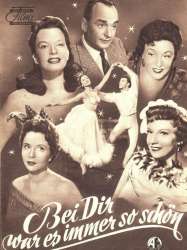
Sans toi je n'ai plus rien (1954)
, 1h30Réalisé par Hans Wolff
Genres Drame, Comédie, Musical
Thèmes La musique, Musique
Acteurs Heinz Drache, Georg Thomalla, Grethe Weiser, Albrecht Schoenhals, Wilhelm Maertens, Carsta Löck
Rôle Regisseur
Note59%





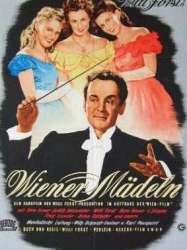
Wiener Mädeln (1949)
, 1h49Réalisé par Willi Forst
Genres Drame, Historique, Musical
Thèmes La musique, Lié à la musique classique, Musique, Adaptation d'une opérette
Acteurs Anton Edthofer, Willi Forst, Judith Maria Holzmeister, Hans Moser, Friedl Haerlin, Leopold Hainisch
Rôle Carl Michael Ziehrer
Note68%





The composer Carl Michael Ziehrer produces twenty two operettas during his career, although he is overshadowed by the more successful Strauss Family.

Operette (1940)
, 1h40Réalisé par Willi Forst
Thèmes La musique, Musique, Adaptation d'une opérette
Acteurs Maria Holst, Willi Forst, Paul Hörbiger, Curd Jürgens, Siegfried Breuer, Gustav Waldau
Rôle Franz Jauner
Note77%






Bel Ami (1939)
, 1h40Réalisé par Willi Forst
Origine Allemagne
Genres Drame
Acteurs Olga Tschechowa, Ilse Werner, Hilde Hildebrand, Willi Forst, Hubert von Meyerinck, Will Dohm
Rôle Georges Duroy / Bel-ami
Note67%





En 1880 Georges Duroy revient à Paris après un séjour au Maroc. Il y retrouve son ami Forestier qui lui donne un peu d'argent, de quoi aller au cabaret ou Rachel interprète la chanson "Bel Ami". Un spectateur perturbe sa prestation en sifflant et criant "à la potence !". Georges Duroy le fait taire en lui envoyant son poing à la figure. Rachel s'approche alors de lui en continuant de chanter et l'identifie à "Bel Ami". Duroy finira la nuit avec Rachel. Puis Forestier fait entrer Duroy à "La vie française" comme journaliste. Duroy à une idée d'article "Casablanca ville Blanche" mais ne parvient pas à l'écrire. Madeleine, la femme de Forestier et également la maîtresse du député Laroche, lui vient en aide, intitule l'article "Le Maroc vu de mes propres yeux" et le fait signer par Duroy. D'autres femmes aideront l'arriviste Georges Duroy dans son ascension, jusqu'à ce qu'il devienne ministre. Suit une partie de canotage romantique qui dégénère en scènes de ménage sur l'eau....Madeleine divorce de Forestier et épouse Duroy. Le ministre des colonies, à la suite de spéculations au Maroc, se retire et est remplacé par Laroche. Duroy finira par congédier toutes ses conquêtes et épouser Suzanne, la fille de Laroche.

Les étoiles brillent (1938)
, 1h43Réalisé par Hans H. Zerlett
Origine Allemagne
Genres Comédie musicale, Musical
Thèmes La musique, Musique
Acteurs Ernst Fritz Fürbringer, La Jana, Carla Rust, Karel Štěpánek, Paul Verhoeven (réalisateur allemand), Arthur Schröder
Rôle Gast
Note62%





Dans les années 1930 en Allemagne, une jeune secrétaire quitte la campagne pour se rendre à Berlin et devenir actrice. À la suite d'un concours de circonstances, elle est prise pour une célèbre danseuse et se retrouve dans le premier rôle d'une sur le tournage d'une revue. L'intrigue a pour toile de fond une revue musicale, comprenant de nombreux films allemands, des sports, du divertissement et des stars des années 1930.

Königswalzer (1935)
, 1h23Réalisé par Eduard von Borsody, Herbert Maisch
Genres Comédie musicale, Musical, Romance
Thèmes Musique
Acteurs Paul Hörbiger, Curd Jürgens, Carola Höhn, Willi Forst, Ellen Schwanneke, Hans Leibelt
Rôle Graf Ferdinand von Tettenbach
Note65%





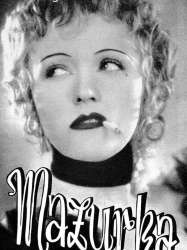
Mazurka (1935)
Réalisé par Willi Forst
Genres Drame
Acteurs Pola Negri, Albrecht Schoenhals, Franziska Kinz, Paul Hartmann, Willi Forst, Friedrich Kayßler
Rôle Extra
Note72%





Une femme est jugée pour le meurtre d'un musicien qui a ruiné son mariage.

So endete eine Liebe (1934)
, 1h34Réalisé par Karl Hartl
Origine Allemagne
Genres Drame, Historique
Acteurs Paula Wessely, Willi Forst, Gustaf Gründgens, Franz Herterich, Maria Koppenhöfer, Rose Stradner
Rôle Le duc François de Modène
Note67%





Comme Joséphine ne peut pas donner un héritier à Napoléon, Talleyrand, conseiller politique de Napoléon, fait tout son possible pour la convaincre que le divorce est inévitable. L'empereur a absolument besoin d'un fils. Joséphine a à cette époque 47 ans et souffre beaucoup d'avoir à se séparer de son mari. Après la prononciation du divorce, Metternich, qui contrôle le destin de l'Autriche, reçoit une lettre de Talleyrand. Napoléon lui-même se rapproche de L'empereur François d'Autriche, car le Corse veut une princesse Habsbourg à ses côtés et sur le trône français. Metternich lui répond que l'empereur est d'accord et lui présentera sa fille Marie-Louise, 19 ans.

Fin de saison (1933)
Réalisé par Robert Siodmak
Origine Allemagne
Genres Drame
Acteurs Alfred Abel, Hilde Wagener, Hans Joachim Schaufuß, Willi Forst, Lucie Höflich, Hans Richter
Rôle Herr von Haller
Note61%





Dans les années 1930, un garçon séjourne avec sa mère dans un hôtel suisse, près d'un lac. L'adolescent rencontre un homme qui le fascine, peut-être chanteur ou prestidigitateur. L'homme lui propose de l'emmener faire un tour dans sa voiture de sport, et la mère semble aussi attirée par ce bel homme. La jalousie du garçon va croissante, culminant dans une scène sur la route la nuit, où le garçon attend l'homme qui lui vole sa mère. Le garçon découvre combien il est difficile de grandir.
 , 1h32
, 1h32Réalisé par Fritz Kortner
Genres Comédie, Comédie musicale, Comédie romantique, Musical, Romance
Acteurs Willi Forst, Dolly Haas, Oskar Sima, Max Gülstorff, Theo Lingen, Ida Wüst
Rôle Paul Hartwig
Note71%






Brennendes Geheimnis (1933)
, 1h32Réalisé par Robert Siodmak
Genres Drame
Thèmes Sexualité
Acteurs Alfred Abel, Hilde Wagener, Hans Joachim Schaufuß, Lucie Höflich, Willi Forst, Hans Richter
Rôle Herr von Haller, Rennfahrer
Note61%






Peter Voß, der Millionendieb (1932)
, 1h44Réalisé par Ewald André Dupont
Origine Allemagne
Genres Comédie, Aventure, Policier
Acteurs Willi Forst, Alice Treff, Paul Hörbiger, Ida Wüst, Otto Wernicke, Josef Eichheim
Rôle Peter Voß
Note66%





Alors que le riche M. Pitt annonce un montant de millions, la banque Schilling & Co. est menacé par la faillite. C'est pourquoi le représentant autorisé Peter Voss simule une effraction, un vol de deux millions de marks. Il veut se cacher maintenant jusqu'à ce que les parts de marché augmentent à nouveau.

Der Prinz von Arkadien (1932)
, 1h29Réalisé par Karl Hartl
Genres Drame, Romance
Thèmes Musique
Acteurs Liane Haid, Willi Forst, Hedwig Bleibtreu, Albert Paulig, Reinhold Häussermann, Ernst Arndt
Rôle Prince
Note68%





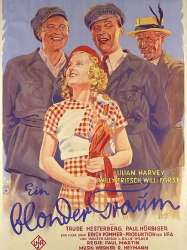
Ein blonder Traum (1932)
, 1h40Réalisé par Paul Martin
Origine Allemagne
Genres Comédie, Romance
Thèmes La musique, Musique
Acteurs Lilian Harvey, Willy Fritsch, Willi Forst, Paul Hörbiger, Trude Hesterberg, Hans Deppe
Rôle Willy II
Note62%





Berlin au début des années 1930. Deux laveurs de vitres de l'entreprise Blitz-Blank, Willy et Willy, pédalent, l'échelle sous les bras et leurs ustensiles dans les mains, ils vont dans la grande ville de mission en mission, de bâtiment en bâtiment. Ils travaillent bien ensemble, jusqu'à ce qu'ils soient intéressés par la même fille, la blonde Jou-Jou. Ils voient derrière la fenêtre de l'ambassade américaine. Alors qu'elle est sur le point d'être mise dehors par le portier, ils la soutiennent.
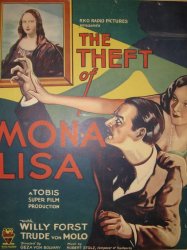
Der Raub der Mona Lisa (1931)
Réalisé par Géza von Bolváry
Genres Drame
Thèmes Hold up
Acteurs Willi Forst, Trude von Molo, Gustaf Gründgens, Max Gülstorff, Fritz Odemar, Paul Kemp
Rôle Vincenzo Peruggia
Note64%





En 1911, Vincenzo Peruggia est un vitrier italien vivant dans la pauvreté. Il tombe en amour avec Mathilde, une femme de chambre française. Frappé par la ressemblance entre Mathilde et La Joconde, Vincenzo décide de voler l’œuvre exposée au Louvre, dans le but d'impressionner son amour. Lorsqu'il découvre que cette dernière est infidèle, Peruggia confesse son crime et est emprisonné.
 Connexion
Connexion


